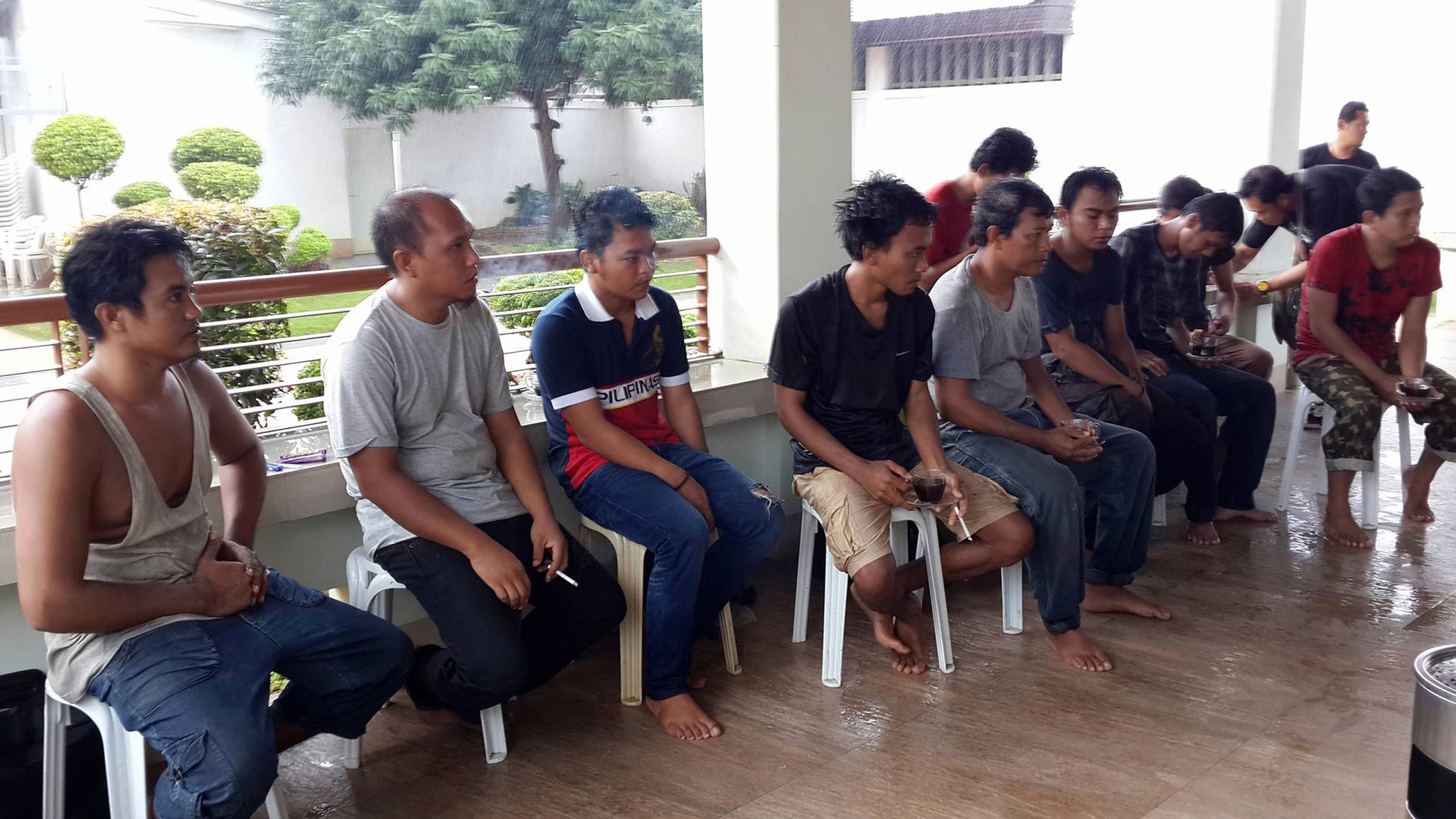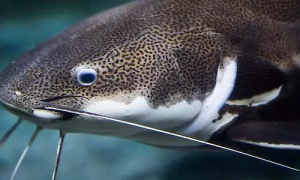导读:去年东南亚发生178起航海攻击事件;而在之前海盗泛滥的亚丁湾与索马里附近海域,得益于多国部队的联合打击,一起也没有。

JAKARTA, Indonesia — Sembara Oktafian was in the engine room of a tugboat chugging toward the Philippines when something didn’t sound right.
印度尼西亚雅加达报道——听见奇怪声响的时候,塞姆巴拉·奥克塔芬正在一艘缓慢开往菲律宾的拖船的轮机舱里。
There was shouting on deck, and shots. Gunmen had boarded, and their message was clear: Come with us, or we will kill you. They shot one crew member and kidnapped four others.
甲板上有人大声喊叫,还传来了枪声。枪手已经登船了,而且他们的意图很明显:跟我们走,不然就杀了你们。他们开枪打了一个船员,绑架了剩下四名船员。
“They were a terrible-looking group, running around with AK-47s,” Mr. Sembara said. “I thought they were going to kill us all, but they only took my friends.”
“他们是一群看起来就很糟糕的人,拿着AK-47步枪跑来跑去。”塞姆巴拉说,“我以为他们会把我们全杀了,但是他们只是带走了我的朋友们。”
The April attack, in the Celebes Sea south of the Philippines, was not isolated, or even out of the ordinary. Southeast Asia now accounts for the majority of seafaring attacks globally, surpassing the Horn of Africa, according to the International Maritime Bureau. And governments in the region are scrambling to combat the problem.
四月份这次发生在菲律宾南部西里伯斯海域的攻击并不是个例,甚至有些不同寻常。国际海事局的资料显示,现在全球航海攻击事件中,绝大多数发生在东南亚。这一地区的政府正在努力解决这个问题。
“In Somalia, the attacks have gone down,” said Noel Choong, the head of the maritime bureau’s piracy reporting center in Kuala Lumpur, the capital of Malaysia. “In Nigeria, the numbers are still there, but not as much as in Asia.”
“索马里的海盗攻击已经下降了。”位于马来西亚首都吉隆坡的国际海事局海盗通报中心主任钟诺尔说,“在尼日利亚,这个数量还是很多,但是没有亚洲多。”
In 2015, there were 178 attacks in Southeast Asia and none in the Gulf of Aden and Red Sea region near Somalia, according to the maritime bureau, after a multinational security crackdown there. The bureau also reported that in the first half of this year, Southeast Asia was the scene of more than one-third of the 98 attacks and attempted attacks globally.
国际海事局的资料显示,2015年,东南亚一共发生178起航海攻击事件;而在之前海盗泛滥的亚丁湾、红海与索马里附近海域,得益于多国部队的联合打击,一起也没有。资料也显示,今年上半年,全球一共发生了98起攻击或者攻击未遂事件,超过三分之一发生在东南亚。
The men who attacked the tugboat, an Indonesian-flagged vessel that had been hauling a coal barge, were later identified as members of Abu Sayyaf, an extremist group based in the southern Philippines that has acted as a hostage-for-ransom gang for more than two decades. It has also pledged its allegiance to the Islamic State.
本文开头处所描述的攻击那艘挂着印度尼西亚旗帜的运煤拖船的人,后来被认出是菲律宾南部极端组织“阿布沙耶夫”的成员,该组织做绑架人质、索要赎金的勾当已经超过二十年了。该组织还曾向“伊斯兰国”表示效忠。
Abu Sayyaf is responsible for most of the kidnappings at sea in Southeast Asia, but several other criminal gangs also operate in those waters.
东南亚大部分海上绑架案都是“阿布沙耶夫”所为,但是也有一些是这片海域其他犯罪团伙做的。
Between March and August, Abu Sayyaf kidnapped 25 Indonesian and six Malaysian seamen in attacks along vital trade routes for coal barges in the Sulu Archipelago. The extremist group continues to hold nine Indonesian sailors from the recent attacks.
在3月到8月期间,“阿布沙耶夫”在苏禄群岛重要的运煤路线上绑架了25名印尼船员和6名马来西亚船员。在最近的袭击中,该组织又扣押了9名印尼船员。
Alarmed by the spate of kidnappings for ransom, Indonesia, Malaysia and the Philippines agreed in May to conduct coordinated naval security patrols in the Sulu Archipelago, and establish a hotline among themselves. In August, they agreed to allow “hot pursuits” of kidnappers and armed robbers by their maritime security forces into one another’s territory.
泛滥成灾的绑架事件使各国政府变得警醒,印度尼西亚、马来西亚和菲律宾于五月份达成了一项协议,在苏禄群岛附近部署海军安全巡逻队,并在各队之间建立热线。八月份,这几国同意海军部队可以在另一国境内对绑架者或武装劫匪进行“热打击”。
“The idea is for the closest patrol boat to take the necessary action,” said Arrmanatha Nasir, an Indonesian foreign ministry spokesman.
“主旨就是,距离最近的巡逻船可以采取必要措施。”印度尼西亚外交部发言人阿玛纳沙·纳西尔说。
The Indonesian Navy thwarted the hijacking of an oil tanker by pirates off the southwest coast of Borneo in May, and arrested nine suspects. But attacks on oil tankers have become less frequent as global fuel prices have dropped, according to a recent report by the Global Initiative Against Transnational Organized Crime.
五月份,印尼海军在婆罗洲西南海域挫败了一起对一艘运油船的劫持,并逮捕了9名嫌疑人。但是《全球打击跨国有组织犯罪公约》的最新报告显示,因为全球油价下跌,针对运油船的袭击也不那么频繁了。
Many attackers are instead targeting ships carrying valuable commercial cargo that can be sold on the black market, such as crude palm oil.
所以,很多袭击者转而盯上了运送贵重商品的货船——像天然棕榈油这样的东西可以在黑市上大赚一笔。
“Most of the criminal gangs that hijack fuel tankers are waiting for fuel prices to go up again, and then they will resume hijacking them,” said Karsten von Hoesslin, a maritime piracy expert and the host of the National Geographic Channel’s “Lawless Oceans,” who wrote the report.
“很多袭击者劫持运油船,等着油价再次上涨,然后如此反复。”报告作者,海盗问题专家、国家地理频道《混乱海域》主持人卡斯顿·范·赫斯林说。
“Until then, they are attacking ships carrying other types of cargo that is now more valuable,” he said.
“在那之前,他们袭击载有其他种类货物的船只,现在那些货物比较值钱了。”他说。
Before the recent surge, Southeast Asia did have some success battling maritime crime.
在最近的行动之前,东南亚在打击海上犯罪上确实取得了一些成绩。
In 1993, the maritime bureau documented about 20 maritime criminal attacks and attempted attacks in Southeast Asia, but that number steadily rose to nearly 250 by 2000.
1993年,海事局记录了在东南亚地区发生的近20起攻击或者攻击未遂事件,但是到了2000年,这个数字蹿升至近250起。
Joint patrols by Indonesia, Malaysia, Singapore and Thailand in the Strait of Malacca — one of the world’s busiest sea lanes — drove down maritime crimes between 2006 and 2009. In 2008, there were only 54 attempted or actual attacks in the region, according to the maritime bureau, compared with 92 in the Gulf of Aden and Red Sea region.
2006-2009年期间,印度尼西亚、马来西亚、新加坡和泰国在世界最忙碌的水道之一——马六甲海峡进行联合巡逻,有效打压了海上犯罪。2008年,根据海事局的记录,该地区仅有54起攻击或者攻击未遂事件,而同年亚丁湾及红海地区有92起。
The recent kidnappings have alarmed the Indonesian government in Jakarta, in particular, because Indonesian tugboats have been the primary targets of Abu Sayyaf militants.
最近的绑架事件给印度尼西亚政府敲响了警钟,因为印尼的拖船成了“阿布沙耶夫”武装分子的主要目标。
Indonesia orchestrated the release of 10 sailors who had been kidnapped in late March by Abu Sayyaf and held for nearly two months by paying, according to the Indonesian news media, a ransom of more than $1 million. Days after that attack, Abu Sayyaf attacked the T. B. Henry, the tugboat that Mr. Sembara was on. He and five other seamen aboard — including the man who had been shot and wounded — were left behind as four others were taken because there was not enough room on the attackers’ speedboat.
根据印尼新闻媒体的报道,印尼政府在3月末通过交了超过100万美元赎金的方式安排解救了10名被绑架了近两个月的船员。那次袭击的几天之后,“阿布沙耶夫”袭击了“T.B.亨利”号,就是塞姆巴拉先生所在的那艘拖船。他和其他五名船员——包括一名遭枪击受伤的船员——被留在了船上,而其余四人被抓走了,因为袭击者的快艇不够大。
Abu Sayyaf attacked another tugboat in June in the Sulu Sea, taking seven Indonesian sailors hostage. Two of those hostages, after being threatened with beheading, escaped in August by swimming out to sea from the Philippine separatist island of Jolo, where Abu Sayyaf is based. They were later rescued.
“阿布沙耶夫”在6月份袭击了苏禄海上的另一艘拖船,绑架了七名印尼船员作为人质。因为受到了砍头的威胁,其中两人在8月份游泳逃出了“阿布沙耶夫”的据点霍洛岛,他们随后获救了。
Some doubt that the recent security agreements to counter the kidnappings will be effective or that the countries will carry through on their pledges of cooperation.
一些人质疑新签订的协议能否有效打击绑架行为,这些国家是否能够履行在合作中的承诺。
Zachary Abuza, a professor at the National War College in Washington, who specializes in Southeast Asian security issues, said the agreements would not satisfy the Indonesian government.
扎卡里·阿布查是华盛顿美国国家战争学院教授,专门研究东南亚安全问题,他说这些协议是无法满足印尼政府的要求的。
“They have been trying to deal with this for several months, and it does not match because there is such a disconnect, and a lack of political will and capabilities,” Mr. Abuza said. “These countries are so very guarded about their territories, but they have very little ways to defend them, which makes them very insecure.”
“他们已经在这个问题上纠缠了好几个月了,也谈不拢,因为几个部门是孤立的,政治意愿和能力也不足。”阿布查说,“这些国家过分纠结于领土问题,却没有能力保护领土,这样就使本国领土很不安全。”
That is little comfort to shipping company bosses such as Suharjono, the operations manager of Global Trans Energy International Jakarta, which owns the T. B. Henry.
不过,对雅加达国际能源运输公司营运经理、“T.B.亨利”号船主萨哈约诺来说,这几乎算不上是安慰。
The four sailors kidnapped from the T. B. Henry were released after 25 days. The company said no ransom had been paid, but the local news media speculated that ransoms had been paid for all Indonesian and Malaysian sailors who had been released.
四名被绑架的“T.B.亨利”号船员在25天之后被释放了。公司称没有交赎金,但是本地新闻媒体猜测,所有印尼和马来西亚人质都是交了赎金之后才被释放的。
“My crew is still traumatized,” said Mr. Suharjono, who, like many Indonesians, goes by one name. “And security is just getting worse.”
“我的船员们还处于创伤之中。”萨哈约诺先生说(和许多印尼人一样,他只提供了这一个名字),“而安全情况越来越差了。”







